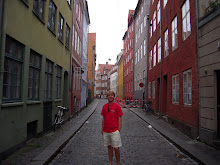John G. Cawelti, in his essay " 'Chinatown' and Generic Transformation in Recent Films", provides an insightful analysis of how Roman Polanski takes the popular genre and American myth of the hard-boiled detective, and twists it around in his film "Chinatown". Cawelti states:
"A film like 'Chinatown' deliberately invokes the basic characteristics of a traditional genre in order to bring is audience to see that genre as the embodiment of an inadequate and destructive myth. We have seen how this process of demythologization operates in 'Chinatown' by setting the traditional model of the hard-boiled detective's quest for justice and integrity over and against Polanski's sense of a universe so steeped in ambiguity, corruption and evil that such individualistic moral enterprises are doomed by their innocent naivete to end in tragedy and self-destruction."
By this point in the essay, Cawelti has already fleshed out the hard-boiled detective structure, and how 'Chinatown' follows it closely (and even pays homage to 'The Maltese Falcon' by way of the similarities between Nicholson & Dunaway to Bogart & Astor), but then severely veers off the structure and ends in chaos and destruction. Instead of solving the crime and going back to a justice-driven, "marginal situation" and being "basically unchanged by what has happened" as the traditional structure would dictate, Detective Jake Gittes (Jack Nicholson) in 'Chinatown', cannot overcome what has occurred, and remains emotionally and psychologically scarred.
Cawelti hits on such a great truth about 'Chinatown' when he talks about how Polanski demythologizes the hard-boiled detective story with this film. Polanski shows an underbelly of a corrupt city, and does not package his narrative up by following the structure. He shows what lurks beneath the surface, and what he reveals is evil. As the character of Hollis Mulwray states before his murder in the film, what is beneath the city of Los Angeles thematically matches up with what Polanski is getting out: there is a giant, dark empty nothingness that has been caused by the movement of tectonic plates in California. Mulwray refuses to build the dam because he knows it might lead to the death of many people; instead it, along with his investigation and realization that Cross is manipulating the city's water supply, leads to his own death.
The other main point associated with this theme that Polanski gets across is the dangerous nature of the myth itself. If people believe myths, and the structure of myths, they might end up as Gittes does: confused, overwhelmed, lost. Gittes witnesses pure evil and pure chaos at the end of the film, and Polanski, by paralleling the detective myth, and then contradicting it at the film's end, attributes some of the guilt for Gittes' end to the creation of myth itself.
Rick Altman, in "A Semantic/Syntactic Approach to Film Genre", talks about how as more scholars "come to now the full range of individual Hollywood genres, we are finding that genres are far from exhibiting the homogeneity" that has been attributed to genres. Essentially, Altman begins to see how it is becoming more and more difficult to pin a film down into one genre. In Polanski's opinion (I would assume), which I would agree with, it seems that the less films that support these film myths the better. As we see with Gittes in "Chinatown", believing in the rigid structure of a myth makes it all the more difficult when your narrative strays from the structure. It is much harder to accept the reality of a life of chaos if you believe so strongly in myth.
Subscribe to:
Post Comments (Atom)

Interesting discussion of the readings Charlie. Some specific examples from the films would be great though...
ReplyDelete-Alexis